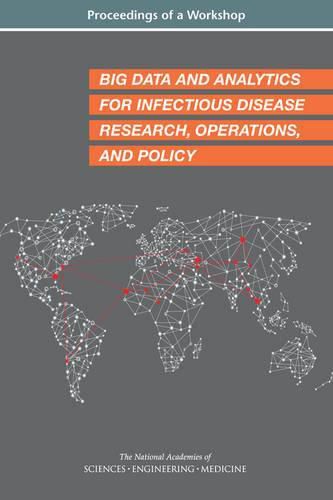Readings Newsletter
Become a Readings Member to make your shopping experience even easier.
Sign in or sign up for free!
You’re not far away from qualifying for FREE standard shipping within Australia
You’ve qualified for FREE standard shipping within Australia
The cart is loading…






With the amount of data in the world exploding, big data could generate significant value in the field of infectious disease. The increased use of social media provides an opportunity to improve public health surveillance systems and to develop predictive models. Advances in machine learning and crowdsourcing may also offer the possibility to gather information about disease dynamics, such as contact patterns and the impact of the social environment. New, rapid, point-of-care diagnostics may make it possible to capture not only diagnostic information but also other potentially epidemiologically relevant information in real time. With a wide range of data available for analysis, decision-making and policy-making processes could be improved.
While there are many opportunities for big data to be used for infectious disease research, operations, and policy, many challenges remain before it is possible to capture the full potential of big data. In order to explore some of the opportunities and issues associated with the scientific, policy, and operational aspects of big data in relation to microbial threats and public health, the National Academies of Sciences, Engineering, and Medicine convened a workshop in May 2016. Participants discussed a range of topics including preventing, detecting, and responding to infectious disease threats using big data and related analytics; varieties of data (including demographic, geospatial, behavioral, syndromic, and laboratory) and their broader applications; means to improve their collection, processing, utility, and validation; and approaches that can be learned from other sectors to inform big data strategies for infectious disease research, operations, and policy. This publication summarizes the presentations and discussions from the workshop.
$9.00 standard shipping within Australia
FREE standard shipping within Australia for orders over $100.00
Express & International shipping calculated at checkout
With the amount of data in the world exploding, big data could generate significant value in the field of infectious disease. The increased use of social media provides an opportunity to improve public health surveillance systems and to develop predictive models. Advances in machine learning and crowdsourcing may also offer the possibility to gather information about disease dynamics, such as contact patterns and the impact of the social environment. New, rapid, point-of-care diagnostics may make it possible to capture not only diagnostic information but also other potentially epidemiologically relevant information in real time. With a wide range of data available for analysis, decision-making and policy-making processes could be improved.
While there are many opportunities for big data to be used for infectious disease research, operations, and policy, many challenges remain before it is possible to capture the full potential of big data. In order to explore some of the opportunities and issues associated with the scientific, policy, and operational aspects of big data in relation to microbial threats and public health, the National Academies of Sciences, Engineering, and Medicine convened a workshop in May 2016. Participants discussed a range of topics including preventing, detecting, and responding to infectious disease threats using big data and related analytics; varieties of data (including demographic, geospatial, behavioral, syndromic, and laboratory) and their broader applications; means to improve their collection, processing, utility, and validation; and approaches that can be learned from other sectors to inform big data strategies for infectious disease research, operations, and policy. This publication summarizes the presentations and discussions from the workshop.